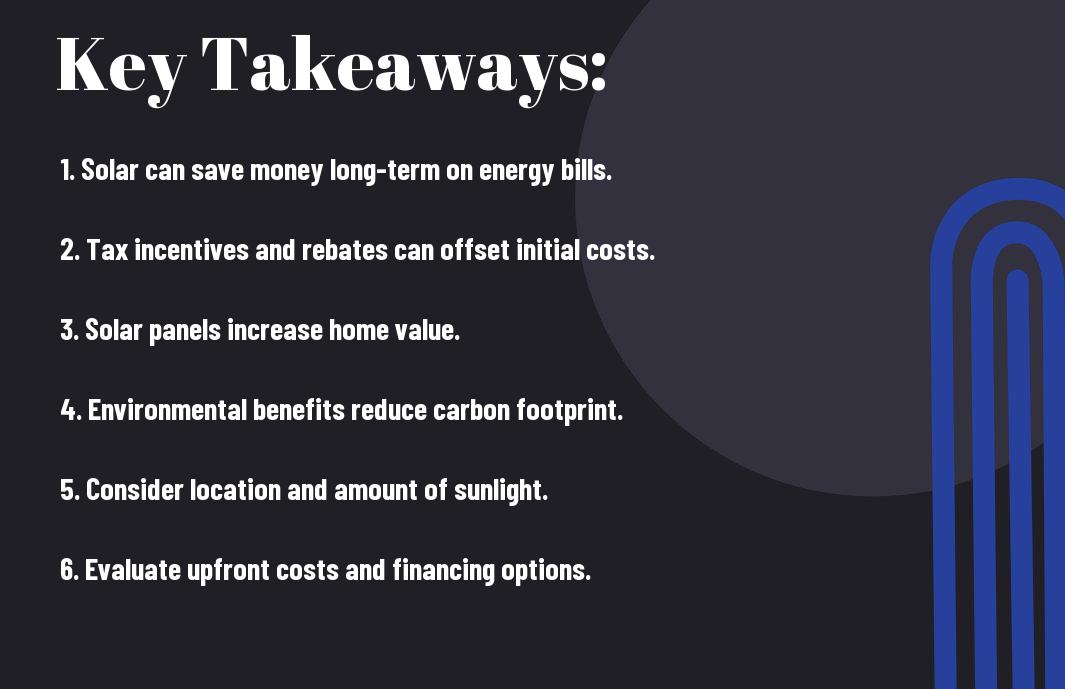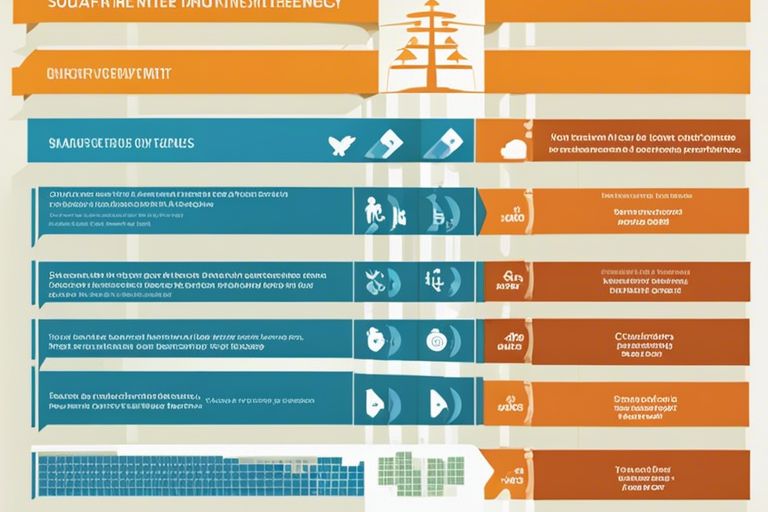It’s time to investigate into the question of whether solar is truly worth the investment for you. As you ponder the decision to switch to solar energy, let’s unravel the complexities and weigh the benefits against the costs. Join us on a journey of discovery as we explore the financial, environmental, and long-term implications of embracing solar power for your home or business.
Key Takeaways:
- Energy Savings: Investing in solar can lead to significant savings on your electricity bills over time.
- Environmental Impact: Solar energy is a clean and renewable source of energy, which can help reduce your carbon footprint.
- Financial Benefits: Various financial incentives like tax credits and rebates can make solar a worthwhile investment.
- Increased Home Value: Solar panels can increase the resale value of your home, making it a valuable asset.
- Energy Independence: By generating your own electricity, you can become less reliant on the grid and protect yourself from rising energy costs.

The Benefits of Solar Energy
Environmental Advantages
To harness the power of solar energy is to take a step towards a greener future. Solar energy is a clean, renewable source of power that produces no greenhouse gas emissions or harmful pollutants. By investing in solar panels for your home, you can significantly reduce your carbon footprint and help combat climate change. Furthermore, solar energy requires very little water to operate, making it a sustainable choice for regions prone to water scarcity.
Financial Incentives
For those considering the investment in solar energy, there are numerous financial incentives that make it an attractive option. Many governments offer tax credits, rebates, and incentives to homeowners who install solar panels. These financial benefits can help offset the initial cost of installation and lead to long-term savings on your electricity bills. Additionally, some utility companies offer net metering programs, allowing you to earn credits for any excess electricity your solar panels generate and feed back into the grid.
Financial benefits of solar energy extend beyond upfront incentives. By generating your electricity, you can protect yourself against rising energy costs, providing a more stable and predictable energy bill. Over time, the savings on your electricity bills can help you recoup the initial investment in solar panels and even potentially increase the overall value of your property.

The Costs of Solar Energy
Any Are Solar Panels Worth It (2024 Guide)? It’s no secret that investing in solar energy can have significant upfront costs. The initial investment in solar panels, installation, and other necessary equipment can be substantial. However, it’s crucial to consider this as a long-term investment that can lead to savings on your energy bills and potentially even generate income through net metering or feed-in tariffs.
Initial Investment
For many homeowners, the initial cost of installing solar panels can be a deterrent. However, it’s important to remember that there are often financial incentives available, such as tax credits, rebates, and financing options, that can significantly reduce this initial investment. Additionally, as technology advances and economies of scale come into play, the cost of solar energy has been steadily decreasing over the years, making it a more viable option for many.
Maintenance and Upkeep
Costs associated with maintaining and servicing your solar panels are typically minimal. Most reputable solar companies offer warranties on their products, covering maintenance and repair costs for a certain period. Generally, solar panels require very little upkeep, mainly consisting of occasional cleaning to ensure optimal efficiency. As such, once your solar energy system is installed, you can enjoy relatively low ongoing maintenance costs, further contributing to the overall financial benefits of going solar.
Solar energy systems are designed to be durable and long-lasting, with minimal maintenance requirements. By investing in solar panels, you are not only reducing your carbon footprint but also potentially saving money in the long run on your energy bills.
Comparing Solar to Traditional Energy Sources
Despite the initial investment, solar energy can be a cost-effective alternative to traditional energy sources in the long run. Let’s compare solar energy to traditional sources based on cost and efficiency.
Cost Comparison
| Solar Energy | Traditional Energy Sources |
| Solar panels have a high upfront cost but minimal operational expenses. | Traditional energy sources like coal and oil have volatile prices and additional costs related to extraction and transportation. |
Efficiency Comparison
| Solar Energy | Traditional Energy Sources |
| Solar panels are becoming more efficient and can now generate a significant amount of electricity. | Traditional energy sources have lower efficiency rates and generate more waste during the energy production process. |
Any investment in solar energy not only benefits the environment but also contributes to reducing your reliance on finite fossil fuels. As technology advances, solar panels are becoming more efficient, making them a competitive option compared to traditional energy sources.
| Solar Energy | Traditional Energy Sources |
| Solar panels can be placed on rooftops or in open fields, utilizing underutilized space. | Traditional energy sources require large power plants or mining operations, impacting the environment and surrounding communities. |

The Role of Government Incentives
Tax Credits and Rebates
For those considering investing in solar energy, government incentives can play a significant role in making the decision financially rewarding. Tax credits and rebates are among the most common forms of government incentives for solar panels. These incentives can help offset the initial cost of installation and make solar energy more affordable for homeowners. Federal tax credits, for example, can allow you to claim a percentage of the cost of your solar system as a credit on your federal taxes.
Net Metering Laws
Laws surrounding net metering are another important consideration when evaluating the financial benefits of investing in solar energy. Net metering laws allow you to sell any excess electricity your solar panels generate back to the grid, necessaryly spinning your electricity meter backwards and providing you with credits on your utility bill. This means that not only can you save money on your electricity bills by using the energy your panels generate, but you can also potentially earn credits or even money by supplying excess electricity to the grid.
Incentives such as tax credits, rebates, and net metering laws can significantly impact the financial viability of investing in solar energy. Before making a decision, it’s important to research the available incentives in your area and factor them into your calculations on the return on investment for solar panels.
Overcoming Common Objections
Once again, as you consider investing in solar energy for your home, you may encounter some common objections that could make you hesitant. Addressing these concerns and debunking myths surrounding solar energy can help you make a more informed decision.
Addressing Intermittency Concerns
Concerns about the intermittency of solar energy may arise, as the sun does not shine 24/7. However, advancements in solar technology, coupled with energy storage solutions like batteries, have significantly reduced this issue. With net metering programs in many areas, you can also credit excess energy generated during sunny hours and use it when the sun isn’t shining, ensuring a continuous power supply for your home.
Debunking High Upfront Costs
High upfront costs are often cited as a barrier to investing in solar energy. While it’s true that installing a solar system can require a significant initial investment, it’s imperative to consider the long-term savings and incentives available. Many governments offer rebates, tax credits, and financing options to make solar more affordable. Additionally, with the decreasing cost of solar panels and the potential increase in property value, the long-term financial benefits outweigh the upfront costs.
Objections to investing in solar energy often stem from misconceptions or outdated information. By debunking myths and addressing common concerns, you can see the value and potential savings that solar energy can bring to your household.
Real-World Examples of Solar Success
Unlike the skepticism you might have about the feasibility of solar energy, many real-world examples showcase the success of solar installations. For instance, on the Was Solar worth it? : r/solar subreddit, you can find numerous firsthand accounts from homeowners detailing how solar panels have not only reduced their electricity bills but also increased the value of their homes.
Residential Solar Installations
To give you an idea of the potential benefits, homeowners often report significant savings on their electricity bills after installing solar panels. In addition to lowering your carbon footprint, generating your electricity can lead to long-term financial savings. Many individuals find that they recoup their initial investment in solar within a few years and enjoy virtually free electricity thereafter.
Commercial Solar Applications
Solar energy isn’t just for residential use; many businesses are also reaping the benefits of switching to solar power. By installing solar panels on commercial properties, you not only reduce operating costs but also showcase your commitment to sustainability, which can be attractive to eco-conscious customers. Additionally, many governments offer incentives and tax breaks for businesses that invest in renewable energy sources, making solar even more economically appealing for commercial use.
Examples of successful commercial solar applications include large corporations, such as Walmart and Apple, who have embraced solar energy to power their operations. By going solar, these companies not only reduce their carbon footprint but also demonstrate environmental leadership, which can positively impact their brand image and attract customers who prioritize sustainability.
Summing up
Following this insight into whether solar is worth the investment, it’s crucial to weigh the costs, savings, and environmental benefits before making a decision. By considering the long-term savings on energy bills and potential tax incentives, you may find that investing in solar panels can be financially beneficial over time. Additionally, the positive impact on the environment cannot be overlooked, as embracing renewable energy sources like solar power can contribute significantly to reducing carbon emissions and combating climate change. If you’re interested in further exploring the topic, you may find this Are Solar Panels Worth It? (2024 Guide) resource helpful.
Q: Is solar worth the investment?
A: Solar is definitely worth the investment for several reasons. Firstly, solar panels can significantly reduce or even eliminate your electricity bills, saving you money in the long run. Additionally, solar energy is a sustainable and eco-friendly option, helping to reduce your carbon footprint and contribute to a cleaner environment. Furthermore, solar panels can increase the value of your property and may also qualify you for tax incentives and rebates.
Q: How long does it take to recoup the initial investment in solar panels?
A: The payback period for solar panels can vary depending on factors such as the cost of installation, your energy usage, local electricity rates, and available incentives. On average, most homeowners recoup their initial investment in solar panels within 5 to 7 years. After this period, you can enjoy free or significantly reduced electricity bills for the remaining lifespan of your solar panels, typically 25 years or more.
Q: What are the financial incentives available for installing solar panels?
A: There are several financial incentives available to encourage the installation of solar panels. These include federal tax credits, state and local rebates, and net metering programs. Federal tax credits can offset a significant portion of the initial cost of solar installation, while rebates offered by state and local governments can provide additional savings. Net metering programs allow you to earn credits for excess energy produced by your solar panels, further reducing your electricity costs.
